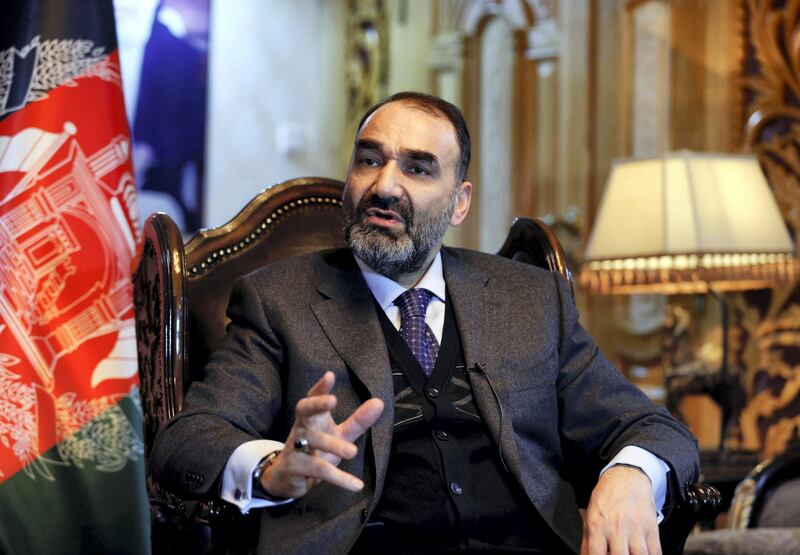“We don’t fight Atta. We need to save Atta from Atta — that’s what Dr Abdullah tells his team every time the governor acts out in public,” an associate close to the Afghan chief executive Dr Abdullah Abdullah told me earlier this year while I was researching for a profile Atta Noor, a powerful governor of the northern Afghan province of Balkh.
At the time, the power and influence held by Afghanistan's longest-running provincial governor was undeniable. It remains so, largely due to the semblance of stability and development he has brought to the northern provinces under his control in a country that otherwise remains precariously balanced on political quicksand.
In February, Afghan president Ashraf Ghani had officially appointed Mr Noor governor, even though he had held the post for the last 13 years.Last week, the president fired the governor by "accepting" an old resignation letter Mr Noor had submitted to the president in "a gesture of good faith" during happier times, when both were striving to weaken the chief executive, who shares power with the president in a US-brokered coalition government.
As expected Mr Noor and his Jamiat party rejected the "resignation" and the governor remains in place in Balkh, a province that has steadily grown into the country's economic hub. He is considered so unassailable that even international stakeholders have turned a blind eye to accusations of human rights violations.
And by calling Dr Abdullah “snake in everyone's sleeve” in public, it is clear who Mr Noor blames for his dismissal.“Your teeth will not sink into us. We will break your teeth,” he said of Dr Abdullah at a public gathering on Saturday.
Dr Abdullah and Mr Noor were close allies for years, their friendship dating back to the civil war when they both fought alongside Ahmad Shah Masood, the slain Mujahideen leader from the Panjshir valley.Mr Noor even backed Dr Abdullah's bid for presidency through Jamiat party in 2009 and again in the 2013 election which ended in a deadlock with Mr Ghani. But the relationship fell apart almost two years ago with Mr Noor accusing Dr Abdullah of failing to stay true to his promises and commitment to Jamiat.
Then earlier this year, Mr Noor referred to Dr Abdullah as a "dear friend" even whilst criticising him as chief executive. "I feel he hasn't been able to deliver the commitments and promises he made. This won't affect our friendship but we have reached a stalemate politically and must part ways," Mr Noor told me in April. "I don't think I will join him in the same political path in the future, but we do have several common goals, including our fight against terrorism and our love for Afghanistan."
Tensions between Mr Noor and the central government have continued to rise over the past few months. In June, a massive public protest, backed by the Jamiat-i-Islami leaders, brought Kabul to a standstill and led to the death of at least four demonstrators in clashes with security forces. The protests achieved little but boosted the standing of the Jamiat party in government - and unleashed a power struggle within the party. within the government // as well as power plays within the party itself.
Another aspect to keep in mind is the enduring ethnocentric nature of Afghan politics. The Jamiat party largely represents ethnic Tajiks, second in number only to the Pashtuns, according to an antiquated population census from decades ago. Allegiance within the Jamiat party is further divided among Mujahideen leaders from different regions.
Political relations are likely to further deteriorate, especially along ethnic lines. Already, the country’s first vice president, Abdul Rashid Dostum, who is also a prominent Uzbek leader, is allegedly in exile in Turkey, apparently to escape charges of assaulting a political opponent. Only a few months ago, Mr Dostum had formed a "Coalition for the Salvation of Afghanistan" with Mr Noor and Mohammad Mohaqiq, leader of the Hazara ethnic groups and deputy vice-president of Afghanistan, creating even deeper fault lines in Afghan politics.
Mr Noor's past offers to step down have always come with a strong desire for a more important role in Kabul but he now finds himself obliged to be concerned about maintaining his position in Balkh - another reason to feel bitter towards his erstwhile
However, the governor is not alone in his disappointment with Dr Abdullah. Several prominent leaders within Jamiat and the government have been critical of Dr Abdullah and moved closer to Mr Noor. These include Salahuddin Rabbani, the current Afghan minister of foreign affairs and the president of the head of the Jamiat party. Meanwhile, other Afghan leaders such as Amrullah Saleh, the former chief of National Directorate of Security, Afghanistan’s intelligence agency, have thrown their support behind Dr Abdullah. And the political turmoil continues to distract the leadership from the crucial task of tackling the growing insecurity in the country.
Dr Abdullah’s team has so far refrained from responding to Mr Noor’s criticisms. However, addressing the growing rift within the party is definitely a priority. concern. But whether they still wish to “save Atta from Atta” remains to be seen.





